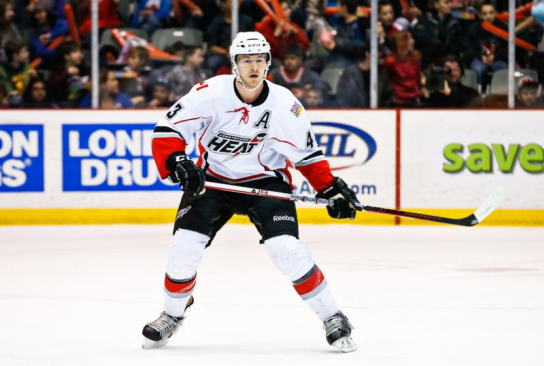Print Edition: March 6, 2013

Photo: Clint Trahan
Despite having a five-day break between matches, the Abbotsford Heat organization had an eventful final week of February in the front office, being involved in two depth trades by the Flames and one close call for the future of the Heat franchise. But let’s start with the positive transactions.
On February 25, the Flames acquired power forward Mike Testwuide from the Philadelphia Flyers in exchange for prospect Mitch Wahl, who has not played the same since taking a huge hit from Aaron Volpatti in his first year with Abbotsford. Testwuide, who was immediately assigned to the Heat, is considered a team player, brought in by Flames’ management in order to add some much needed third and fourth line depth at the NHL level. In 161 career AHL games, Testwuide has picked up 70 points and 168 penalty minutes, but has struggled offensively this season, with only two goals in 19 games with the Flyer’s affiliate the Adirondack Phantoms.
Later in the week, the Flames exchanged veteran Heat defenceman and alternate captain Joe Piskula for enforcer Brian McGrattan, who has since been recalled by the Calgary Flames. McGrattan, who spent the 2009-2010 season in a Flames jersey, picked up a goal and three assists along with 86 penalty minutes in 34 games with the Flames that season. An intimidating presence on the ice, the 6-foot-4, 235-pound tough guy adds a lot of grit to any lineup he’s a part of, once posting an absurd career high 551 penalty minutes in 2004-2005 while a member of the Binghamton Senators.
Both these moves change the dynamic of the Heat lineup, trading finesse and strong defensive skills for toughness. The Piskula trade is a big loss for the backend of the Heat, which was already notably thin, and will have to rely more heavily on its younger players for a calming presence on defence.
Then came a real head scratcher of a transaction. The Flames attempted to sign Colorado Avalanche forward Ryan O’Reilly to an offer sheet which would pay him $10 million over a two year period, an offer which the Avalanche had one week to match or O’Reilly would become the newest member of the Flames and potential top line centre.
Or would he?
According to Rogers Sportsnet, if the Flames were successful in their attempt to sign O’Reilly to an offer sheet, the forward would have to pass through waivers before he could report to the Flames. This meant that the Flames would have lost a first and a third round draft pick to the Avalanche, all while another team could have snatched O’Reilly while he was sitting on re-entry waivers. For an aging Flames team without a solid pool of prospects to spare, this oversight could have proved disastrous for the team’s future if it had gone through.
Although the Avalanche matched the offer sheet within 24 hours, Flames GM Jay Feaster claimed that the report from Sportsnet was mistaken, contending that, “Prior to tendering the offer sheet for Ryan O’Reilly we, as a hockey operations department, examined whether there were any impediments to our successfully securing the services of the player including, but not limited to, his having played in the KHL after the start of the current NHL season.”
Whether it was a good move or not, a potential disaster was avoided because the Avalanche matched the offer tendered by the Flames, preventing the hockey world from seeing the first casualty of the new CBA agreement the NHLPA and NHL spent half a season negotiating.

